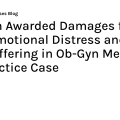Leading formula manufacturer Abbott Laboratories has been ordered to pay $495 million to a woman whose infant daughter developed necrotizing enterocolitis (NEC) after consuming its baby formula — and the verdict could jeopardize formula production nationwide. The American Academy of Pediatrics (AAP) said in a press release that NEC lawsuits could affect the availability of formula designed explicitly for preterm infants. Abbott Laboratories and Mead Johnson, who make Similac and Enfamil, are the only two companies in the U.S. that produce fortified cow’s milk formulas for premature babies, and both manufacturers are facing hundreds of NEC baby formula lawsuits from parents who allege that the companies failed to warn them about the link between NEC and baby formula.
What Is NEC?
Necrotizing enterocolitis is a rare health condition that primarily affects premature infants. It’s a gastrointestinal disease characterized by inflamed and infected tissue in the intestine. NEC has a mortality rate of up to 50%, and babies who are lucky enough to survive may have lifelong health complications. The exact cause is unknown, but researchers have found that babies fed cow’s milk-based infant formula are more likely to develop the condition. One report from the U.S. Surgeon General states that premature babies who aren’t breastfed are 138% more likely to develop the condition. In the past, the American Academy of Pediatrics has recommended that preterm infants only receive their mother’s breast milk or human donor milk.
Some common NEC symptoms are bloody stools, vomiting, lethargy, and trouble feeding. The disease typically develops within the first two weeks of a premature infant’s life, and it’s crucial to seek medical attention if you notice these symptoms in your child. NEC can affect full-term infants, but it’s much less common — only 1 in 10,000 babies who aren’t premature are diagnosed with NEC. In comparison, 1 in 1,000 preterm infants are affected.
If a medical professional suspects NEC, they’ll likely order an imaging test, like an abdominal X-ray, to confirm the diagnosis. They might also perform blood work or take a fecal stool sample to verify what’s happening. Once the condition is officially diagnosed, treatment should start immediately; babies are more likely to recover when NEC is caught quickly. An affected baby will immediately stop receiving oral feedings, including formula, and transition to IV fluids. A doctor may recommend a nasogastric (NG) tube to help get rid of built-up gas, and they’ll likely prescribe antibiotics.
In some cases, this will be enough to treat the condition — but about 25% of infants will need surgery to recover. During the procedure, a surgeon will remove the parts of the intestine that have died or perforated. NEC has numerous potential long-lasting effects. According to a study published in the Seminars in Perinatology medical journal, 89% of NEC survivors experience long-term complications. Digestive, bowel, and nutritional difficulties were the most common problems reported. The study concludes that NEC can affect the quality of life for decades after a baby is discharged from the NICU.
NEC Baby Formula Lawsuits
Although studies have found a link between NEC and cow’s milk baby formula products, the parents and guardians of premature infants diagnosed with the condition say that no one warned them about the increased risk. In fact, Abbott and Mead Johnson advertise that their products are as safe and effective as breastmilk. Many parents of NEC infants say they wouldn’t have chosen to feed their babies formula if they’d known about the connection between the product and the disease. As a result, these parents are suing the formula manufacturers.
The cases have been consolidated into multidistrict litigation (MDL) to streamline them and are being handled in the U.S. District Court for the Northern District of Illinois. By one recent count, there are more than 530 cases within the MDL. The $495 million verdict against Abbott Laboratories is one of several recent victories for plaintiffs in baby formula lawsuits. In the most recent large verdict, the jury awarded $95 million in compensatory damages and $400 million in punitive damages to the Illinois woman who sued Abbott. The woman’s daughter was diagnosed with NEC in 2021 and suffered brain damage that has left her in need of long-term care. In March, a jury ordered Mead Johnson to pay $60 million to a woman whose baby died after consuming Enfamil formula. It isn’t clear how the remaining cases will play out, but there’s reason to believe there could be more significant verdicts in the future.
Baby Formula Production
How will these lawsuits affect formula production? Soon after the verdict against Abbott was announced, the company’s stocks fell. While Abbott Laboratories and Mead Johnson are worth billions of dollars, it’s conceivable that being forced to pay sizable verdicts could put a financial strain on the companies. The AAP statement spells out the organization’s concern. There isn’t enough donor human milk available to feed preterm infants exclusively, the press release says, and specialized formula is often necessary for care.
“Courtrooms are not the best place to determine clinical recommendations for the care of infants. Feeding decisions should be made by clinicians and families. These need to be individualized in the context of human milk availability, specific patient needs, and individual family preferences,” said AAP president Benjamin Hoffman in the release.
As NEC cases continue to move through the court system, whether the verdicts won against formula manufacturers will affect formula production will become apparent. In the meantime, parents whose babies were diagnosed with NEC after being fed baby formula should consult with an NEC baby formula attorney who specializes in these cases to determine whether you may have a legal path forward. You may recover damages for medical bills, time spent away from work, pain and suffering, and other losses you’ve experienced.




